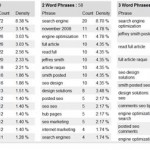You can buy links, you can buy domains, but let’s face it, you just can’t buy credibility. Credibility takes time, typically there is no way around it. You have to earn your stripes, and with SEO, actions speak louder than words.

Time is an equation that alludes to authority and authority begets popularity. Sensing that this could be an argument in the making or a self reciprocating vicious cycle, to develop credibility you need exposure. Without popularity, there is no engagement, without engagement there is no popularity.
I know this sounds like double talk, but in reality, that is what search engine algorithms are doing day in and day out. Calculating, tabulating, indexing, assessing and grading your content on a query by query basis. Every time someone hits enter after typing a few keywords or a key phrase a battle erupts for the top ranking results in search engines.
What makes it into the bin from indexing (the collective data cloud that represents the collective sum of your website) is what the hand of search and information retrieval finds when it reaches into the cookie jar to pull out a website (like a drawing) based on relevance score.
The Search Engine Shakedown:
Quality control filters exist to perform the shake down on would be candidates a.k.a websites. Their intention is to interrogate your content thoroughly to assess who are you [title]? how old are you [authority]? did you borrow any ideas from others [duplicate content]? who links to you [link popularity]? how do you link to yourself [internal linking]? are you tagged properly[ tagging and social bookmarks]. It is this aspect of the algorithm that is looking for tell tale signs of popularity, trust and stability.
If I have said it once, I will say it a million times, don’t just build (external) links, build authority instead. The crux of SEO revolves around three main premises (1) on page factors i.e. code, meta data, page structure and content (2) off page factors i.e. crawl issues, server load time, link popularity and (3) reputation i.e. traffic, engagement, trust an authority determines where you fit in the equation on the subject/keyword query.
While others dig into backlinks like a forensic analysis, website authority does not leave easily discernible traces of (1) why your website ranks for competitive terms hardly mentioned on the page? or (2) How is it that you rank for thousands of diverse keywords equally or (3) why is there no trail to retrace to create a blueprint for your ranking method?
The real solution, Authority! Authority is not something you bottle up, break asunder and then piece it back together to put on display. It is a side effect or rather aggregate affect that transcends the conditional aspects of the framework it occupies.
Wikipedia is an example of a ranking juggernaut capable of devouring essentially any topic it embraces. Not only is the model based on user generated content, but it also ranks for virtually every title, inurl: convention and H1 topic it references. This immense yet practical site architecture embodies advanced SEO theory and simple common sense simultaneously.
Keeping Site Architecture Simple to Conquer Each Keyword:
Who would have thought a simple formula like [keyword] – Website Tagline, [keyword] in H1 tag, [Keyword] prominently setting the tone of the content and [keyword] also in the URL structure would have such an impact?
Let’s take a word like internet for example. With 2.2 billion competing pages I would like to see a 10 page website topple this keyword. Wikipedia on the other hand with its collective link equity as a result of constant reinforcement and re-investment of link weight, 27,105 external links (that we can see) and a smattering of over 240 uses of the word on the page out of over 8000 words on the page essentially trumps any other website or page online for this keyword.
If you can learn anything about SEO, realize that content is the key to unlock a websites potential and keywords are a means to focus in on virtually any topic. If you want to occupy the crowning achievement of any topic, you need topical relevance, topical volume and topical continuity to emerge victorious (and a few links from powerhouse sites never hurt as well).
In Closing:
The takeaway here is, infrastructure is important (think optimized CMS here), content whether it is UGC (user generated content) or streamlined from a series of SEO copywriters, you must have an element that invokes something more than dry pages filled with lackluster copy. Embrace a topic, create a focus, then create other pages that share the focus to acquire a competitive keyword.
Vibrance and distinction of word choice create a unique disposition. That distinction nudges the most remote aspects of the algorithm to assess and pay regard to your website and elect it as an information ambassador once you topple the threshold.
Unique content augmented by plateaus that exceed standard benchmarks are deemed as authorities on a topic. One thing remains similar among sites imbued with this metric regardless of industry, topic or website. That unmistakable attribute that has a metric of fortitude is time.
Just having an older site does not ensure success, however if you provide the appropriate signals to search engines, understand the value of forecasting and the effect or layering and linking aggregate content based on virtual theming, then true website authority and credibility are within your grasp over time.
Think of the sum of each page layered succinctly on a topic to produce a resolute statement. Much like the analogy of grapes turned into wine and that wine aging and getting stronger over time, content and internal links have a similar effect algorithmically.
Watch Where you Point that Thing:
This component of authority is unchanged at the core of search algorithms regardless of the topic or industry a website is founded. The real takeaway here is, build your own authority instead of relying on other sites to provide a short-cut from link juice to the top. Because once you gain credibility and authority in your field, what can’t you accomplish as a result?








